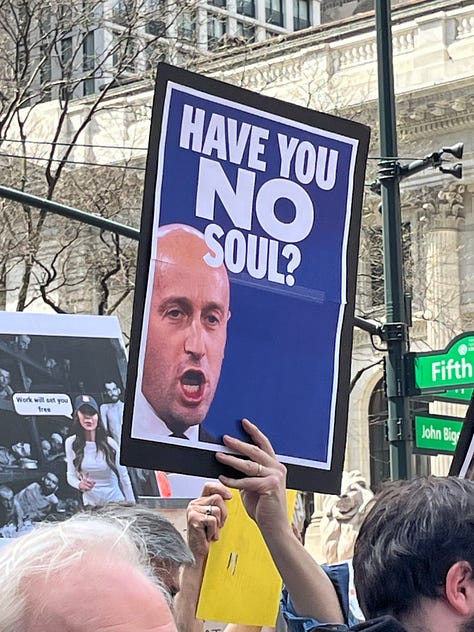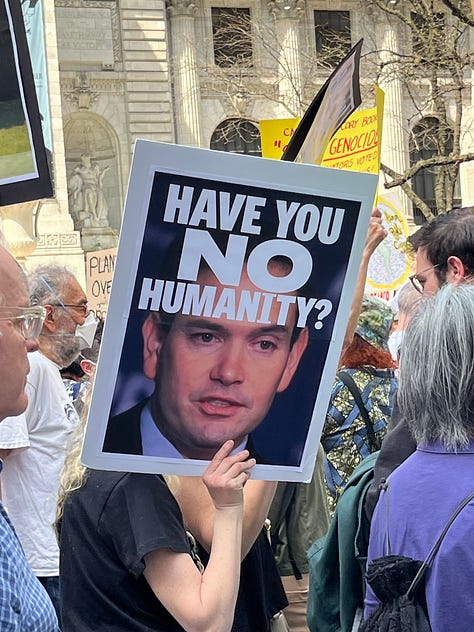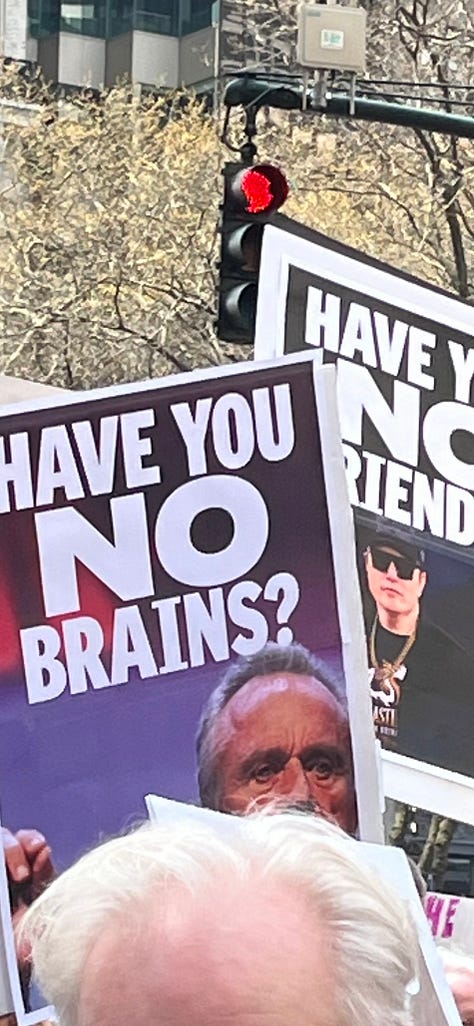Notes in Movement Time
Why April may be remembered as the month when the tide started to turn. Plus, debating the how the words we use may help us win.
Guess What? We’re Still Here!
April 20 came and went with no declaration of the Insurrection Act. Can everyone who shared that terrifying viral post about how martial law would be declared that day please now share a note saying “Hey, we’re still here!” Or something equally cheerful to counteract the unnecessary fear-mongering? The times are crazy enough!
As my friend and movement historian L.A. Kauffman says, we have to Spread Courage. As she writes in her new newsletter (which I urge you all to sign up for), “Every army knows the importance of morale. So does every sports team, every company, and every organization. Our pro-democracy movement of many movements can't treat morale as an afterthought and hope to win.” Celebrating the brave Defiance of the many people and institutions who are standing up in this challenging time is essential, and as she suggests, we need to incorporate that practice into our work at every level. (Read the whole thing).
Last Saturday, in New York City, some 25,000 of us marched from the steps of the New York Public Library through midtown, past the fortified streets around Trump Tower, to the edge of Central Park. We were one of 700 such rallies that took place last weekend, a sign of the continued growth of the Defiance rising in response to Trump’s assault on American democracy. As Rep. Jamie Raskin says, “A rally a day keeps the fascists away.”
I’ve marched in these Manhattan streets more times than I can remember. But the mood this time felt different to me, more serious somehow, as if we knew this was not something we could take for granted anymore. Which it’s not. In our part of the crowd walking uptown we were surrounded by a mixed group, old and young, mostly but definitely not entirely white. I saw several people using canes or walkers as well as plenty of people in their teens and twenties. Several older couples (including me and my better half) walked hand in hand with their partners. Behind me, at one point, I heard a father holding his young daughter explaining the signs around her: “That one says, ‘RESIST.’ When someone tries to take something we care about away from us, we resist.”
As with all these events, the best part is witnessing the creativity of one’s fellow marchers. We passed the Sing Out Louise group singing musical parodies that drew a circle of happy participants. And this series of protest signs won my prize for best in show:






A Call for People’s Hearings
Here’s another suggestion for what the Defiance could be doing, in addition to regular visible days of protest and ongoing efforts to lift up acts of courage: People’s Hearings on the Trump/Musk chainsaw massacre, to be held in red, purple and blue districts around the country. A friend of mine wrote me the following, asking to keep their name out of view but offering the idea to the movement:
The idea is to stage “People’s Hearings” around the country on all the cuts that Musk and Trump purport to effectuate across government — hearings that a normal functioning Congress would hold, to challenge the overreach of the executive branch and force Musk and others to explain themselves, to give representatives of the people a chance to say “That’s crazy, that’s not OK, you must make a case.”
These could be done in public spaces, set up theatrically with a spirit of performance, the way that candidates sometimes stage debates when their opponent doesn’t want to debate — with two podiums and a cardboard cutout — with people in suits playing roles. The idea is not just to do a stunt but to take this moment, when the public has begun to catch its breath, and ask the most fundamental question that got bypassed during the DOGE shock and awe and will be evaded during the budget process: “Why?” Why are we cutting cancer research by 40 percent? Wait, why are we destroying the ability of soybean farmers to sell their surplus to countries that want and need it? Remind me what shuttering the CDC has to do with anything the American people asked for? Why are we eliminating our capacity for disaster relief?
This refocusing on the underlying WHY will shift the narrative burden back to DOGE et al to explain themselves. To defend their actions in an arena outside the courtroom, where the discourse is technical and inaccessible.
This is something the folks behind the 50501 protests could get behind, or clusters of local Indivisible groups could organize. But it would have more salience if done in a coordinated way.
—Related: The Center for American Progress, which has been doing great work tracking Trump’s impact, has built this map showing DOGE cuts by city, state and congressional district.
What to Call This Ugly Beast
A week ago, Anat Shenker-Osorio, one of the progressive movement’s premiere messaging experts, started sharing a new memo on “Fascism and the English Language” with guidance on how to talk about Trump II that she hopes everyone will adopt. You can read the whole thing (it’s less than two pages) but I just want to zero in on her top two suggestions because I’m not quite sold on them.
Does Shenker-Osorio’s work influence others? Absolutely. Google “MAGA Regime” for example and you can find it being used by NextGen America, State Democracy Defenders Action, the Revolving Door Project, the Women’s March, Social Security Works, and End Citizens United, to name a few. The Contrarian, a widely read newsletter led by Washington Post refugee Jen Rubin and former Ambassador Norm Eisen gave Shenker-Osorio a nice repost of her memo. Michael Podhorzer, the former political director of the AFL-CIO, did a livestream with her on it.
While I agree that every day, Trump II is behaving more and more like an autocratic regime, not an administration abiding by the rule of law, and that he and his followers are fascists, I’m still not sold on abandoning the more neutral words like “government,” “administration,” “constitutional crisis” and “violation of checks and balances.” Not because I disagree with Shenker-Osorio’s assessment that “we are past the point of any kind of normalcy [and] this is not just a sort of standard right-wing administration that we disagree with,” as she says in her conversation with Podhorzer.
Rather, what concerns me about her language suggestions is that they don’t sound the way people talk. And I know I’m not alone in this—one friend and colleague who is also a messaging expert told me they worried using words like “fascist” and “regime” could shut off people who don’t like to think about politics rather than bring them along.
“We have to figure out how to talk to people about what's going on in the most human and natural and non-political-jargon language we can possibly manage,” this person said. And, they added rather than using labels as shorthand, we need to keep telling people what the problem is.” Saying “he’s a dictator” isn’t as compelling as saying why that’s a bad thing—he’s abusing his power to let criminals off the hook, to take away people’s rights and freedoms, or to enrich the billionaire class. (In fairness, if you listen to Shenker-Osorio’s conversation with Podhorzer, it’s clear that she also wants us to talk about specific harms, not just use general terms.)
I emailed Shenker-Osorio to ask about whether “fascist” and “regime” were too harsh or jargony, and specifically if words like "fascist" were not advised because a) most people have no idea what it means, b) to the extent they do, it conveys strength (pumping up Trump more), and c) it also causes a fear response and is demotivational. She replied quickly:
“Regime isn't jargon - it's very easily understood, especially in context. And using it allows us to reserve the words "administration" and "government" to mean very important things. For the latter, the civil service/public workers etc, in other words the idealized ‘we the people’ thing. Administration is just absolutely too sanguine a term for what this Trump thing is. It conveys business as usual.
“On fascism/fascist - we have been genuinely surprised by people's easy facility with this term in focus groups, which we're doing weekly. The caution you raise - conveying strength - is a valid fear for ‘authoritarianism.’ An astonishing number of Americans are open to whatever they perceive that concept to be. What fascism conveys is best analogized to what ‘death panels’ did during the Affordable Care Act debate: I may not know what that is but I know I hate it. And, truly, that's what we need out of a label - not an answer worthy of passing AP government.
“The purpose of effective messaging isn't to say what is already popular but rather to make popular what we need said.”
What Shenker-Osorio is suggesting is that, for most Americans, “fascism” isn’t a word they already have a lot of knowledge about beyond associating it with “when the people in charge do horrifying things” so now is the time to make it stick to Trump and his minions. We can pour the meaning we want into this vague signifier, in other words. And if we start using it constantly, others will follow.
Speaking just for myself, I’m wary of using a phrase like “fascist regime” heavily because I think it makes the speaker sound like one-of-those-people-who-obsess-too-much-about-politics and therefore a turnoff. Remember, we need to do more than just rally the people who are already paying attention and who are therefore outraged (in the words of the bumper-sticker).
Finally, and perhaps I’m quibbling too much here, I don’t quite understand why Shenker-Osorio and Podhorzer dismiss words like “democracy” and “un-American” as being un-useful, in the first case because it’s too process-y and we’ve never really had a true democracy, and in the latter case because it’s too negative to make clear what it is we’re standing for. I disagree. If we can pour the meaning we want into “fascist regime” and make it a negative signifier for all that is not normal and wrong about Trump, then we can also talk about the meanings of democracy that do resonate plainly for people, like “rule by the people.” If “democracy” were a meaningless word for our movement, why do crowds always chant “this is what democracy looks like”?
Same with calling Trumpism “un-American.” Those of us who have a grasp on history know that everything Trump is doing – the bullying, the looting of the public purse, the attacks on weak and marginal groups, the assualt on the free press and academia, the imperialistic bluster – all of that is sadly very American. But so is fighting for truth, justice, fairness and the rule of law. It’s very American to stand up against bullies and Nazis, too. We’d be stupid to cede this turf in the same way that we’d be stupid to let the other side own the flag.
How to talk to sports fans about Trump
Here's a counterexample of how to talk about the current crisis. Mike Florio, a former lawyer who is now a sports broadcaster who co-hosts Pro Football Talk for NBC Sports, used the opening of his show last Friday to engage his listeners about the Kilmar Abrego Garcia case. Speaking from the heart and talking as a 60-something-year-old who remembers how America worked in the years of Nixon’s impeachment, he urged them to “Take off the red suit, take off the blue suit, and put on the red-white-and-blue suit.” He went on:
“I care about this country. I care about our future, and I care about what’s going on now. When you lose, you’ve lost in court. You have to comply with the order of the court. You can’t just say, ‘make me.’… When you lose, you’ve lost. What’s happening where there is this open defiance of a ruling we don’t like. I lost some cases. I don’t love to be able to go to the newspaper and say that judge should be impeached. I don’t love to be able to say the whole system is illegitimate. I don’t love to be able to say defund the courts. But I lost. And you move on. That’s how it works. That’s how a nation of law and order works.
…This is not hyperbole. There has to be three functioning branches of our government. If one is determined to ignore the other two… Now, one has the second one under its thumb right now. But if the one is going to completely ignore the third one, we have the makings of a serious problem that, again, this is not rhetoric. It threatens to tear down our entire system of government and way of life.”
When you lose a case and you’ve lost all your appeals, “You take the L,” he said, language that any sports fan would understand. After he finishes, his co-host responds supportively, stating, “this is not a monarchy.” (You can listen to the episode here, or read a post that Florio wrote about it here. On X, it’s been viewed a million times.)
Now, many sports fans responded to Florio’s comments by urging him to leave politics out of his commentaries. Lots of people turn to sports to escape current events, after all. But even on X, which tilts right, you can see many people applauding him speaking up. He also says that the reaction he’s gotten has been “surprisingly positive.” And talking to sports fans about politics in the context of accepting a loss rather than trying to impeach the refs (or calling on the fans in the audience to attack their families) makes common sense, no?
Your mileage may vary. What is your experience these days when you talk about the situation with others? Leave a comment—real life is always more complicated than a focus group. Let’s learn from each other.
Also Noted
—The second wave of Bernie Sanders’ “Fight Oligarchy” tour ended last week with some impressive results: A total of more than 250,000 people have attended these 16 rallies (all but three in GOP districts), with nearly 67% of them new to the Bernie email list. One-third say they aren’t registered Democrats; 42% say they aren’t college grads; and more than 7% say they’re registered Republicans. So, true to form, Sanders and his colleagues on the barnstorm are reaching beyond the choir. Faiz Shakir, Sanders’ chief political strategist, says they are following up with all attendees, asking them to demand town hall meetings from their congressional reps and urging them to stand firm against Medicaid cuts and tax cuts for the rich, as well as engaging them on local legislative fights. But the work of pulling off these giant rallies seems to be taking most of their time and attention. Shakir says that so far, “We have hired a handful of local organizers on the ground in four states,” which is about where they were a month ago when I spoke with him for my American Prospect piece. He adds, “There's much more to come soon. We are only getting started with our organizing and candidate recruitment plans.”
—It's likely we’ll look back on the last few weeks as an inflection point. Before the April 5 Hands Off mass protests and Harvard’s “Hell No!”, all kinds of civic leaders and institutions were caving in to Trump. Then came the abduction of Garcia and a wave of outcry, even from nominal conservatives like David Brooks. Now, instead of obeying in advance, many more are disobeying in advance. That’s how I read this new statement from more than 150 presidents of American colleges and universities denouncing the “unprecedented government overreach and political interference” they’ve been experiencing. Backstopping and prodding that work forward were nearly 5100 faculty who, under the aegis of the American Association of University Professors and We are Higher Ed, pulled together a Day of Action for Higher Ed on April 17. (They also estimate that more than 20,000 faculty and others with a stake in higher education have signed at least one protest letter.)
—See also this Open Letter Rejecting President Trump’s Attacks on Nonprofit Organizations, which is still collecting signatures in anticipation of what is likely coming next.
—And see also #Reaffirm the Oath, a campaign mobilizing lawyers to get together on Law Day (May 1) to publicly renew their commitment to the Constitution.
—Attend: NY Attorney General Tish James is hosting a community impact hearing May 8, in concert with her colleagues Kwame Raoul of Illinois and Keith Ellison of Minnesota. It’s at Westchester Community College, which just happens to be in a district of one Rep. Mike Lawler (R-NY).
Deep Thoughts
Henry Farrell’s essay on how both tyrants and crowds have vulnerabilities that we can learn to respectively exploit or solve for is worth reading closely. The core idea is that power in modern societies flows from social coordination. Both dictators and pro-democracy movements have coordination challenges. We need to get better at solving ours before Trump and crew get better at solving theirs.
End Times
Have you been avoiding eye contact with other drivers? Help is on the way.



I'm going to be a grumpy contrarian here and say that this entire idea of political messaging seems pointless. I've started to talk openly to friends around me — here in my dark-red Appalachian state — and absolutely no one is arguing about what word to use, or what rhetoric to adopt, or how to talk to a sports fan, or how American/un-American anyone is.
The friend who is a manager at a Starbucks tells me how incredibly afraid they are of their student loan payments coming due. The friend who is an independent musician with an autistic son tells me how goddamn angry they are at RFK's anti-autism plans. The friend who worked for over 20 years at the FDA tells me how terrifying it felt to see the DOGE kids walking the campus, aloof in their sadistic and nonsensical cost-cutting. The friend who fled to Canada is petrified that the Fed will be taken over by Trump and weaponized.
We don't need more words. Just tell the goddamn truth.
Those protest posters are excellent. They are by Bonnie Siegler. People can get them here: https://contrarian.substack.com/p/have-you-no-posters?fbclid=PAZXh0bgNhZW0CMTEAAaf8kz9iHzixkGoUNehT-KW85JwTIQVb6d5OuaVyAR9jhPeD3xkUkOi0BLh7Xw_aem_7ZQheU0TXQSH-GpnBJXIBg
She also wrote this book, Signs of Resistance https://www.hachettebookgroup.com/titles/bonnie-siegler/signs-of-resistance/9781579658748/